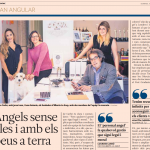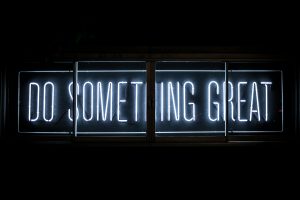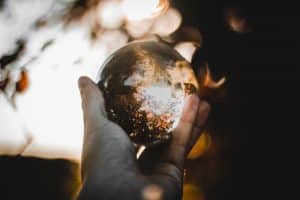
The daily life of the extraordinary
Editorial The Lifestyle Institute | Author: María José Núñez | July 2022
How does the 1% really live? What shape does daily life take for those who have a luxury lifestyle? For most of us, those questions remain unanswered, at least as far as personal experience goes. One of our lecturers, Sara Emilia Bernat, is dedicated to bringing that reality ( a surreal one for many of us) closer through her participation in the book Private Views: A High Rise Panorama of Manhattan by Andi Shmied, in which the author describes the epicentre of Manhattan.
(Sigue en español)
The 1% represents wealth and power, which can also be translated as money and influence… These are people that have between 5 and 30 people to help them organize their lives, they travel around the world every year, and they’re able to donate millions of dollars to universities. They invest in themselves, they collect art, they buy islands, they are the hosts of private parties, and they buy Rolex… So what can we take away from the pages of this interesting book? First up is the concept of exclusivity, but in what sense? The book explains in detail about exclusivity of location, which not only determines who lives there, but is also exclusive due to the impossibility that anyone can access those kinds of buildings. In fact, the journalist infiltrated the luxurious residential apartments in order to get a detailed and complete insight into Manhattan’s elite. The result is somewhat unprecedented and captures what could be considered the art of privileged living, or, in more realistic terms, “the daily life of the extraordinary”. This is the natural habitat in which Personal Angels exist.
The place where you live will give you status…
“These houses are not just exclusive residences, but also opportunities to define status”: this is how S. E. Bernat explains it in her article ‘Inside the Nest’ which can also be found in the book. What does she mean by this? Regardless of the high acquisition power that the owner of a luxury apartment has, the privileged views that they have from their penthouse, or the open dimensions that they have to live in and the team they have working for them, means that being the owner of that apartment, also means being given a kind of a label, reward or ‘title’, which helps them to distinguish themselves as ‘elite’. This is concept that takes us to the definition ‘select few’ and from there we move on to being ‘one of the few chosen ones’, meaning having something that is inaccessible to the majority is a unique opportunity; a privilege defined by status. To be able reach this level is so unique and representative that it is unprecedented and extraordinary, but also something so routine, because for this small percentage of people, the daily life of their existence is like this, regardless of the vision of glamour or a frivolous lifestyle that people who are not immersed in that world may have.
To see Manhattan from your own bedroom window. That is the notion of everyday life that our clients have and that we, as Personal Angels, experience in one way or another, first-hand, when working face-to-face with a luxury environment. To get to the crux of the matter, when opulence forms part of your daily life, the extraordinary ceases to be exceptional, and therefore the singularity is in how we will live that life. This is where the PA comes into it, by helping to manage a lifestyle that is so unique and unusual for many and ordinary for a minority.
“Social status is the social position of a person in relation to another group or situation. It tends to be described as a place that people form in their mind regarding the social position of themselves and of others (…). It is the respect and difference that exists between individuals within a society”
Sumptuous views such as the ones shown in the book ‘Private Views’ can be exceptional, as can acquiring a unique work of art, hiring a private jet, being the owner of several mansions at the same time and in different locations around the world – meaning that you have exactly what you need at any given moment-, spending time with important people or royals, owning a yacht, organizing dinners, etc. But, in the end, there are also many things that are similar to a normal person: their job, the education of their children, holidays, the daily menu, food shopping, clothes, decoration, housekeeping (multiplied by x), pets, sport, leisure… But everything on the highest level possible: the economic level is higher, meaning that life also expands on all fronts – economically, and therefore, in most cases, socially, professionally, culturally… and definitely with greater complexity. This complexity can generate respect and make us feel that the world is our oyster, but once again there is that, let’s say, effigy (called this way due to the hidden presence of a kind of ‘invisibility’) with which we opened our reflexion: the personal (guardian) angels. Perhaps that is where the extraordinary transforms into the ordinary, and at the same time, becomes sublime.
Copyright ©by Alberta La Grup
If you wish to re-print this article or photos, that’s fine. Just include the biography at the end of the article. Thank you!
Photo Credits: Unsplash
Translation: Emily Benton
La cotidianeidad de lo extraordinario
Autora: María José Núñez | Barcelona, Julio 2022
¿Cómo vive el 1% de la población? Es decir, ¿qué color y silueta tiene la vida de quienes conforman el sector del lujo? Son preguntas que, para la gran mayoría, están muy lejos de ser respondidas. Al menos, en toda la extensión que supone su conocimiento. Una de nuestras profesoras, Sara Emilia Bernat, ha contribuido a acercar esa realidad (irreal para muchos) con su participación en el libro Private Views: A High rise Panorma of Manhattan, de Andi Shmied, donde su autor describe la vida en el epicentro de Manhattan.
Ese 1% representa riqueza y poder, que podríamos traducir en dinero e influencia… Gente que tiene de 5 a 30 personas que le ayudan a organizar su vida, que viaja alrededor del mundo cada año, que tiene la capacidad de donar millones de dólares a universidades; son individuos que invierten en ellos mismos, que coleccionan arte, que compran islas, que son anfitriones en fiestas privadas, que compran Rolex… Por ello, ¿qué ideas podemos extraer de las páginas de esta interesante lectura? Primero, el concepto de exclusividad. ¿En qué sentido? En el detalle de que la exclusividad de lugares que nos muestra este libro no sólo la determina quiénes habitan allí. También lo es por la imposibilidad de que cualquiera pueda acceder a estos edificios. De hecho, el periodista se infiltró en el interior de estos lujosos apartamentos residenciales de lujo para realizar una minuciosa y completa radiografía de la élite de Manhattan. El resultado es algo inédito, donde se plasma lo que se puede denominar el arte de vivir de forma privilegiada. O lo que es mejor o más cercano a la realidad: una muestra “de la cotidianeidad de lo extraordinario”. Y lo que finalmente es el hábitat natural donde también nos movemos los Personal Angels.
El sitio donde vivas te va a dar estatus…
“Estas viviendas no son sólo residencias exclusivas, sino oportunidades de distinción de estatus”: así es como lo explica S.E. Bernat en su artículo Inside the Nest, donde interviene en el libro que hemos mencionado. ¿Qué nos indica con ello? Que independientemente del alto poder adquisitivo que disponga el propietario de un apartamento de lujo, los privilegiadas vistas que pueda tener desde su ático, la amplitud y dimensiones de los que disponga para vivir y de la gente a su cargo de la que pueda disponer, ser propietario allí es, además, como una etiqueta, galardón o ‘título’ que le va a distinguir como ‘élite’, concepto que nos lleva a la definición de ‘selecto’, y de selecto pasamos a ‘ser de unos pocos elegidos’, es decir, donde la mayoría no puede acceder pues la oportunidad es única, como una concesión condicionada por el estatus. Y tan único y representativo de llegar a ello es lo que lo hace tan inédito, extraordinario pero, a la vez, tan cotidiano porque para ese mínimo porcentaje, su existencia, su día a día, es así… independientemente del ‘glamour’ o de la frívola visión que se pueda tener para quienes no están inmersos en ello.
Ver Manhattan desde tu propia habitación. Ésa es la noción de lo cotidiano que nuestros clientes, y la que nosotros, Ángeles Personales, vivimos de algún modo, también en primera persona, cuando trabajamos cara a cara con nuestro ámbito: el lujo. Y yendo al quid de la cuestión, cuando la opulencia forma parte de la vida ordinaria de una persona, para ésta lo extraordinario deja de ser excepcional y, por lo tanto, la singularidad estará en cómo viviremos esa vida. Y ahí es dónde entra en escena el PA, ayudando a gestionar ese ‘lifestyle’ insólito e inhabitual para muchos, común y corriente para una minoría.
“El estatus social es la posición social de alguien respecto a otro grupo o situación. Suele describirse como un lugar que las personas forman en su mente frente a la posición social de sí mismos y de los demás (…) Es el respeto y la diferencia que se concede a los individuos dentro de una sociedad”
Excepcionales pueden resultar unas suntuosas vistas como las que muestra el libro ‘Private views’, así como adquirir una creación artística única, contratar un jet privado, mantener varias mansiones al mismo tiempo y en distintos lugares del mundo -de manera que se disponga de éstas en cualquier momento que se requiera-, codearse con altos mandatarios o royals, etiqueta en yates, organización de cenas, etcétera. Pero al final, tan frecuente y usual como el día a día de una persona de a pie, con su trabajo, la educación de los hijos, las vacaciones, el menú diario, las compras de comida, ropa, decoración, y mantenimiento de una casa (multiplicado por x), mascotas, deporte, ocio… Pero todo elevado a la máxima potencia: pues es mayor el nivel económico, con lo cual, el volumen de una vida se ve expandido en todas las esferas: la económica, y por ende, en la mayoría de los casos, la social, profesional, cultural… y en definitiva, una mayor complejidad. Y lo complejo puede ocasionar respeto y sentir que el mundo nos viene grande, pero ahí está otra vez esa -llamémosla- efigie (por la importancia de su presencia enmascarada en una aparente ‘invisibilidad’) con el que abríamos esta reflexión: los ángeles (de la guarda) personales. ¡Quizás sea ahí donde lo extraordinario se transforme en cotidiano, y a su vez, se convierta en sublime!
Todos los derechos reservados ©by Alberta La Grup
Si quieres publicar este artículo o fotografía, está bien. Sólo debes incluir la biografía, autor y esta información sobre los derechos. Gracias.
Crédito de fotos: Unsplash
Traducción: Emily Benton





